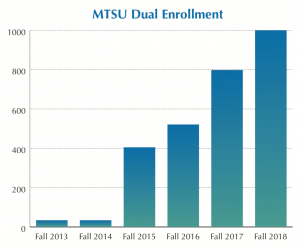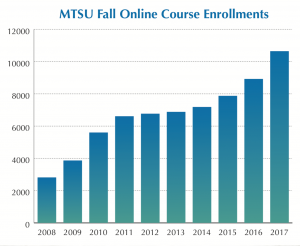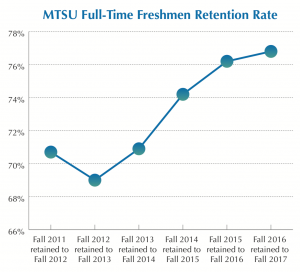Committed to the Quest
| August 29, 2018
 Considering the cost of college, students can’t afford not to graduate, especially if they have student debt. Yet, American universities suffer from chronic attrition. About a third of college freshmen don’t return for a second year. Universities have tried various strategies to keep students on a path to graduation, but nationally the six-year completion rate hovers at 57 percent. Attrition isn’t just expensive for students. Universities take a hit too—especially in Tennessee, which in 2010 began using outcomes rather than enrollment numbers to calculate higher education funding. At that time, a 3,000-student freshman class at MTSU could expect to lose 900 students the first year. Only half the class would graduate within six years.
Considering the cost of college, students can’t afford not to graduate, especially if they have student debt. Yet, American universities suffer from chronic attrition. About a third of college freshmen don’t return for a second year. Universities have tried various strategies to keep students on a path to graduation, but nationally the six-year completion rate hovers at 57 percent. Attrition isn’t just expensive for students. Universities take a hit too—especially in Tennessee, which in 2010 began using outcomes rather than enrollment numbers to calculate higher education funding. At that time, a 3,000-student freshman class at MTSU could expect to lose 900 students the first year. Only half the class would graduate within six years.
The Quest for Student Success, which the University launched in 2013, radically rethought the University’s approach to attrition. While MTSU has always targeted at-risk populations for support, our new Office of Student Success is boosting every student’s chance to succeed. Working collaboratively, the University has overhauled student advising, developed fresh options for academic help, and redesigned courses that are traditional stumbling blocks to graduation. At the same time, we are using predictive analytics—an approach more commonly associated with health care than higher ed—to fight attrition in a highly surgical way. Predictive data can help identify students who are at statistical risk of attrition even if they don’t fit into traditionally “at-risk” population. Armed with this knowledge, our faculty and advisors can watch them to spot any problems early and get them back on track.
 The results of the Quest have been dramatic, and it has become a standard by which other such initiatives are measured. In 2017, MTSU was one of just 45 American universities invited
to join Re-Imagining the First Year, an initiative sponsored by the American Association of State Colleges and Universities (AASCU) and funded by the Bill and Melinda Gates Foundation, to help other institutions improve their student success, too. And recently, AASCU extended an invitation to me to share our student success initiatives with university presidents from across the country.
The results of the Quest have been dramatic, and it has become a standard by which other such initiatives are measured. In 2017, MTSU was one of just 45 American universities invited
to join Re-Imagining the First Year, an initiative sponsored by the American Association of State Colleges and Universities (AASCU) and funded by the Bill and Melinda Gates Foundation, to help other institutions improve their student success, too. And recently, AASCU extended an invitation to me to share our student success initiatives with university presidents from across the country.
Here are the most recent updates regarding our collective work to improve student success at MTSU. Thank you for your help in achieving these gains.
 Under the leadership of Provost Mark Byrnes, work continues to revise and update MTSU’s Quest for Student Success 2013–16. Since the launch of the original Quest, MTSU
has witnessed unprecedented outcomes on key student success measures. For example, the full- time freshman retention rate has increased from 69 percent to 76.8 percent. Similar increases in retention have been observed for every student category (sophomores, juniors, seniors) and across all colleges.
Under the leadership of Provost Mark Byrnes, work continues to revise and update MTSU’s Quest for Student Success 2013–16. Since the launch of the original Quest, MTSU
has witnessed unprecedented outcomes on key student success measures. For example, the full- time freshman retention rate has increased from 69 percent to 76.8 percent. Similar increases in retention have been observed for every student category (sophomores, juniors, seniors) and across all colleges.
Accomplishments like these have drawn national attention, and MTSU’s student success initiatives have been highlighted in the New York Times, Washington Post, Chronicle of Higher Education, and more than a dozen other national publications.
Input is being solicited from across the University for the revised plan, Quest for Student Success 2025. Current members serving on the Quest committee include:
Mark Byrnes, provost (committee chair)Joe Bales, vice president for university advancement
David Butler, vice provost for research and dean, College of Graduate Studies
Jeff Gibson, professor and chair, Department of Theatre and Dance
Joey Gray, associate professor, Department of Health and Human Performance, and 2017–18 Faculty Senate president
Mary Hoffschwelle, professor, Department of History and director, MT Engage
Faye Johnson, associate provost for planning and partnerships
Marva Lucas, professor and chair, University Studies
Susan Myers-Shirk, professor, Department of History and director, General Education
Ken Paulson, dean, College of Media and Entertainment
David Schmidt, vice provost for international affairs
Deb Sells, vice president for student affairs and vice provost for academic and enrollment services
Rick Sluder, vice provost for student success and dean, University College
Data resources: Chris Brewer and Sylvia Collins of Institutional Effectiveness, Planning, and Research
Please be on the lookout for additional information, and do not hesitate to contact any member of the work group if you have questions or need additional information. Find out more about this very important initiative atmtsu.edu/provost/quest-2018.
Nearly a year ago, a group of dedicated academic advisors began meeting to devise a comprehensive professional development and training plan. Through their efforts, the Advisor Mastery Program (AMP) was created and implemented. AMP provides our advisors with access to a wide-ranging series of professional development and training opportunities. This includes anything from webinars, lunch-and-learns, sessions led by advisors and others from across campus, and workshops featuring nationally recognized student success experts.
Through their participation in these sessions, advisors earn points with the goal of attaining annual AMP certification. Twenty-nine advisors were recognized for completion of the Advisor Mastery Program at an advisor annual retreat and workshop in April.
Today, two committees guide this important work. The Professional Development Committee is chaired by Amber Bollinger, advisor in the Jones College of Business. The Training Committee is led by Janae Daniels, an advisor in the College of Media and Entertainment.
The Advisor Mastery Program will host Florida Atlantic University’s Jennifer Bloom on campus Sept. 13–14. Bloom co-founded the Appreciative Advising and Appreciative Education movements. She will conduct an Appreciative Administration session on Thursday, Sept. 13. Please RSVP to Amber.Bollinger@mtsu.edu if you would like to attend.
Learner support for MTSU students continues to evolve. Two primary components of learner support at MTSU are free tutoring and Supplemental Instruction (SI). Although in operation for a relatively short period of time, both tutoring and SI have evolved rapidly and are crucial components of MTSU’s efforts to support students.
Free tutoring is now offered for more than 200 courses each semester. In 2017, students spent 15,557 hours in tutoring, a 120 percent increase over 2015. MTSU’s tutoring program was highlighted nationally in an article published inEDUCAUSE Review.
Supplemental Instruction has also quickly become a core component of our system of learner support. The first SI courses were implemented as a pilot in 2016–17, involving 57 course sections across three colleges with a potential to impact 3,047 students. In 2017–18, SI had grown to serve 118 course sections across five colleges with a potential to impact 4,990 students. MTSU’s SI efforts have been recognized nationally.
In Fall 2017, Rick Sluder, the leader of MTSU’s Office of Student Success, was identified as one of 25 state leaders from across the country for making a difference with educational technology. Named as an “EdTech Hero” by EdScoop.com, Sluder was recognized for work occurring on the MTSU campus involving the application of predictive analytics in student success.
MTSU is a participant, along with other selected universities, in the Survey of Student Experiences. This project is coordinated by the Coalition of Urban Serving Universities and the Association of Public and Land Grant Universities. The purpose of the project is to build awareness of the psychological components of student success to understand how programs, policies, processes, and communications impact student persistence and retention. The goal is to use this knowledge to increase and expand the efficacy of existing student success strategies at MTSU. Five institutions from the cohort will be selected and provided with multi- year funding to further develop and implement lessons learned.
MTSU was one of 22 institutions selected by AASCU to participate in an Institutional Transformation Assessment. This project, funded by the Bill and Melinda Gates Foundation,
In June, researchers representing the Harvard Graduate School of Education and the Bill and Melinda Gates Foundation visited MTSU to study work completed as a part of the Quest for Student Success. Representatives met with MTSU staff to learn about strategies that might be used by other universities to enhance leadership capacity, institutional research, and strategic finance in student success initiatives.
Finally, let me state that students rely on MTSU academic advisors, who work tirelessly to guide them toward a successful educational future, even if that means countless appointments, emails, and phone calls. Among those advisors is College of Liberal Arts advising managerLucy Langworthy, who was recently recognized nationally for her diligence with an award from the National Academic Advising Association (NACADA). Langworthy received the 2018 Region
MTSU is a participant, along with other selected universities, in the Survey of Student Experiences. This project is coordinated by the Coalition of Urban Serving Universities and the Association of Public and Land Grant Universities. The purpose of the project is to build awareness of the psychological components of student success to understand how programs, policies, processes, and communications impact student persistence and retention. The goal is to use this knowledge to increase and expand the efficacy of existing student success strategies at MTSU. Five institutions from the cohort will be selected and provided with multi- year funding to further develop and implement lessons learned.
MTSU was one of 22 institutions selected by AASCU to participate in an Institutional Transformation Assessment. This project, funded by the Bill and Melinda Gates Foundation,
In June, researchers representing the Harvard Graduate School of Education and the Bill and Melinda Gates Foundation visited MTSU to study work completed as a part of the Quest for Student Success. Representatives met with MTSU staff to learn about strategies that might be used by other universities to enhance leadership capacity, institutional research, and strategic finance in student success initiatives.



